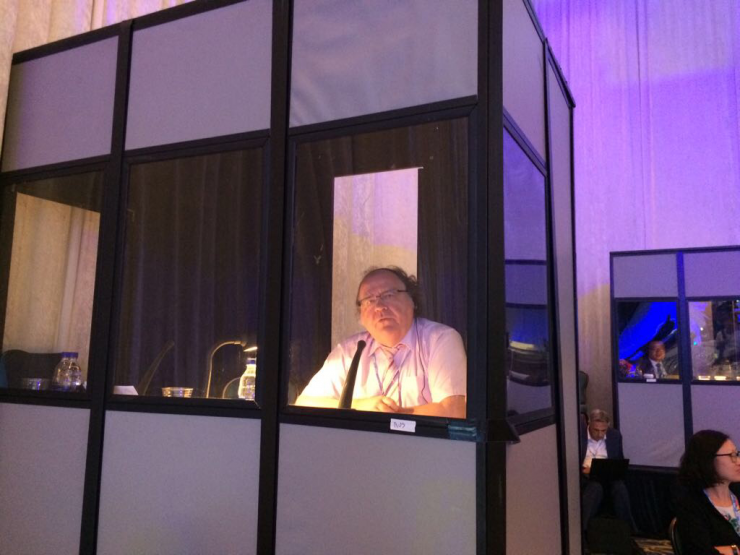Juin 2020
Entretien
Spotlight on... Konstantin Ivanov

Lisez cet entretien en français
Konstantin Ivanov is Swiss and Russian, and is a graduate of the Faculty of International Economic Relations of the Moscow State Institute of International Relations (MGIMO), as well as the United Nations language training course in Moscow at the Maurice Thorez Institute of Foreign Languages, which trained Russian interpreters for the UN from 1960 to 1980.
From 1978 to 1982, he worked as a translator at the United Nations Office at Geneva. He then taught translation and interpreting for ten years in the French department of the MGIMO, the Faculty of International Economic Relations and Moscow Business Language Proficiency Examination Center of the Paris Chamber of Commerce, which was based at the MGIMO, and the Ministry of Foreign Affairs of the USSR. After that, he spent six years at the International Monetary Fund, heading a small group of interpreters and translators working in fiscal administration in Moscow.
Since 1998, Konstantin has been a freelance interpreter in Geneva (Russian, English, French, Spanish and Ukrainian), working for a number of organizations, including the International Telecommunication Union, International Labour Organization, World Health Organization, World Meteorological Organization, World Intellectual Property Organization, World Trade Organization, United Nations Office at Geneva, International Monetary Fund, European Bank for Reconstruction and Development, Centre for Development and Environment, United Nations Environment Programme, Organization for Security and Co-operation in Europe and the Union of European Football Associations. He has taught simultaneous and consecutive interpreting courses from French and English to Russian at the Faculty of Translation and Interpreting (FTI) since November 2006. In 2009, he obtained a Master of Advanced Studies in Interpreter Training from the FTI with a dissertation entitled “Simultaneous Interpretation with Text. Is the Text ‘Friend’ or ‘Foe’? Laying Foundations for a Teaching Module”.
What does teaching interpreting mean to you?
In nutshell, it’s about training our successors to ensure that this splendid profession will endure, all the while creating competition for ourselves in the interpreting market. It is a healthy and stimulating competition that gives us a boost and makes us proud of what we have achieved for our profession. I love working with my former students and take great pleasure in seeing how much they have progressed – all the more so since, when it comes to training conference interpreters, transmitting to them the know-how (those famous hard skills!) and professional conduct skills, are even more important than knowledge, and so their progress becomes all the more evident once they have entered the professional world. FTI is among the top interpreting schools, and when Russian was added to its languages, I became the first interpreter trainer with Russian as an A language – so you can just imagine how I feel!
How were the last few months for you in terms of the quarantine and online teaching?
The end of my career at the university took an unexpected turn. Like everyone else, I had to deal with a lot of challenges, stress and mental fatigue. My workload doubled. I had some doubts, but with the motivation of our terrific leadership team, or as we call them, our very own KLM airline company (Kilian Seeber, Lucía Ruiz Rosendo, Manuela Motta), our Department was able to transform itself and adapt to this new reality without much damage. Thanks to Zoom, my consecutive interpreting courses remained practically intact. However, without the right technological support, my online simultaneous interpreting courses, while allowing students to perfect their knowledge, could not and cannot replace in-class training, due to the nature of this particular skill.
To conclude, what are your plans after retirement?
I would like to find other ways to put my skills as an interpreter trainer to use, for example through coaching, offering in-person and online private and group classes, and collaborating with other teaching institutes in Switzerland and abroad. I would also like to finish an article that I started writing a few months ago on the FTI’s Interpreting department (where I’ve been working for a good 15 years!) for the Russian journal of interpreters and translators “Мосты” (“Bridges). And, of course, I intend to continue working as a conference interpreter, side by side with my former students!
